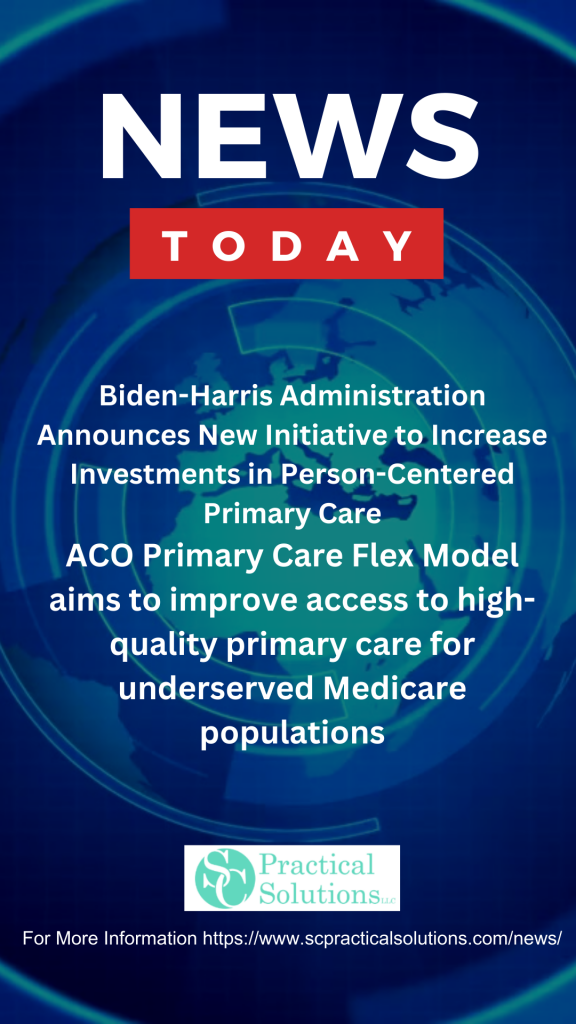 Biden-Harris Administration Announces New Initiative to Increase Investments in Person-Centered Primary Care
Biden-Harris Administration Announces New Initiative to Increase Investments in Person-Centered Primary Care
ACO Primary Care Flex Model aims to improve access to high-quality primary care for underserved Medicare populations
Today, the U.S. Department of Health and Human Services (HHS), through the Centers for Medicare & Medicaid Services (CMS), announced a new voluntary model that empowers primary care providers in eligible Accountable Care Organizations (ACOs) to treat people with Medicare using innovative, team-based, person-centered proactive care. A key part of the Biden-Harris Administration’s efforts to further promote competition in health care, the ACO Primary Care Flex Model (ACO PC Flex Model) will provide a one-time advanced shared savings payment and monthly prospective primary care payments (PPCPs) to ACOs. The advanced shared savings payments provide ACOs with needed resources and flexibility to cover costs associated with forming an ACO (where relevant) and administrative costs for required model activities. PPCPs will be distributed by ACOs to primary care practices, giving them improved resources and flexibility to provide care that best suits individuals’ needs.
The model is the latest example of the CMS Innovation Center’s investment in strengthening the primary care system. The Innovation Center was established by the Affordable Care Act to identify ways to improve healthcare quality — improve health outcomes for individuals — and reduce costs in Medicare, Medicaid, and the Children’s Health Insurance Program (CHIP).
“We continue our work to improve the quality of care for people with Medicare by encouraging more primary care providers to participate in the ACO Primary Care Flex Model,” said HHS Secretary Xavier Becerra. “Incentivizing greater investments in primary care will promote competition among health care providers and enable more people to receive coordinated, high-quality preventive care to keep them healthy – regardless of where they live. HHS will continue building on the Affordable Care Act, which not only brought more people coverage, but allowed us to develop innovative models that foster quality care, improve outcomes, reduce costs, expand access to services, and advance health equity.”
“People whose primary care provider participates in the ACO PC Flex Model may get care in more convenient ways, like care based at home or through virtual means, extra help managing chronic diseases, and more preventive health services to keep them healthy,” said CMS Administrator Chiquita Brooks-LaSure. “Not only will people with Medicare receive more coordinated, seamless care that addresses their unique needs, but CMS is supporting primary care clinicians and giving them more flexibility to provide person-centered care.”
As part of the HHS initiative to strengthen primary care, the ACO PC Flex Model is designed to incorporate health equity and address health disparities in primary care. The model enhances primary care funding and incentivizes team-based care approaches to medical and social needs, which will create total cost of care savings while preserving or enhancing the quality of care. Rates for the PPCP will be derived from county-average spending to more accurately reflect the cost of providing comprehensive primary care to underserved populations.
“By giving ACOs more flexibility and additional funding and support to deliver high-value primary care, the ACO PC Flex Model can help providers identify and address people’s unmet health-related needs,” said Liz Fowler, CMS Deputy Administrator and Director of the CMS Innovation Center. “This model strengthens incentives for more providers to form ACOs and meet CMS’ goal of increasing the number of people with Medicare who are in an accountable care relationship.”
The CMS Innovation Center will test this new model within the Medicare Shared Savings Program. The model will focus on and invest in low revenue ACOs, which tend to be smaller and mainly made up of physicians. Low revenue ACOs have historically performed better in the Shared Savings Program, demonstrating more savings and stronger potential to improve the quality and efficiency of care delivery. The ACO PC Flex Model’s payment structure also promotes competition by providing a pathway for low revenue ACOs, which often have fewer resources, to continue serving people with Medicare while providing an alternative for physicians to stay independent.
The ACO PC Flex Model is a five-year voluntary model that will begin on January 1, 2025. CMS is planning to select approximately 130 ACOs to participate in the model. Organizations interested in participating must first apply — either as new ACOs or renewing ACOs — to the Shared Savings Program. Shared Savings Program Applications are open May 20, 2024 – June 17, 2024. The ACO PC Flex Model Request for Applications (RFA) is planned to be released in the second quarter of 2024.
For Frequently Asked Questions about the Primary Care Flex Model, please visit: https://www.cms.gov/priorities/innovation/innovation-models/aco-primary-care-flex-model/faqs.
For a fact sheet on the model, please visit: https://www.cms.gov/files/document/aco-pc-flex-fs.pdf.
Posted In: Resource Information